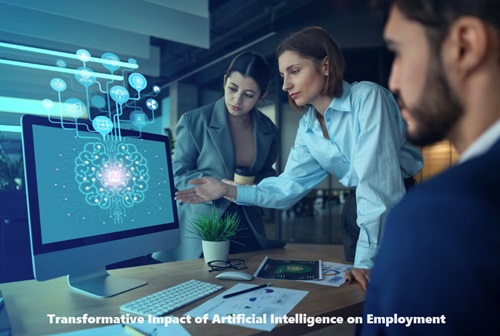Transformative Impact of Artificial Intelligence on Employment-In the contemporary professional landscape, the relentless march of technology, particularly Artificial Intelligence (AI), has fundamentally reshaped the nature of our jobs. This seismic shift demands a comprehensive exploration of the ways in which AI is revolutionizing employment paradigms.
Transformative Impact of Artificial Intelligence on Employment

Unveiling the Transformative Impact of Artificial Intelligence on Employment
The Dynamic Landscape of Job Automation
AI’s pervasive influence extends far beyond our daily lives, infiltrating industries and job markets with unparalleled efficiency. Automation, driven by AI, is not merely a buzzword but an irreversible force. Jobs that were once considered immune to automation are now being streamlined, leading to increased efficiency but also prompting a reevaluation of skill sets.
Enhanced Efficiency and Streamlined Operations
AI’s Role in Workflow Optimization
One of the key facets of AI’s impact on employment is its role in enhancing efficiency and operational processes. From predictive analytics to intelligent decision-making algorithms, AI is enabling businesses to optimize workflows, fostering a more agile and responsive work environment.
Evolving Skill Sets: Navigating the Digital Frontier
The Metamorphosis of Skill Demands
As AI continues to reshape industries, the demand for specific skill sets is undergoing a metamorphosis. The emphasis is shifting from routine tasks to higher-order cognitive abilities. Skills such as data analysis, critical thinking, and adaptability are becoming paramount, heralding a new era where human capabilities synergize with AI technologies.
The Rise of Collaborative Intelligence
Human-AI Partnerships
Contrary to the apprehensions surrounding job displacement, AI is fostering collaborative intelligence. Human-AI partnerships are becoming the norm, wherein AI augments human capabilities, allowing for the delegation of mundane tasks and empowering individuals to focus on creativity, innovation, and complex problem-solving.
Challenges and Opportunities in AI-Infused Workplaces
Navigating the Ethical Terrain
The integration of AI in the workplace is not without challenges. Ethical considerations, data privacy concerns, and the need for reskilling are critical aspects that demand attention. However, these challenges present opportunities for businesses and professionals alike to evolve and adapt to the evolving landscape of AI-driven employment.
Navigating the Future: Proactive Adaptation
Embracing Change for Empowerment
In an era where change is the only constant, proactively adapting to the evolving employment landscape becomes imperative. Embracing AI as a tool for empowerment rather than a threat requires a commitment to continuous learning, reskilling, and a strategic approach to career development.
Conclusion
As we navigate the profound transformations brought about by AI in our professional lives, staying informed and agile is the key to success. This article serves as a guide, shedding light on the multifaceted impact of AI on employment and providing insights to empower individuals and businesses alike. Embrace the future, armed with knowledge and a proactive mindset, and thrive in the age of AI.
Frequently Asked Questions:
- Is AI really replacing human jobs? AI is not replacing jobs but reshaping them. While routine tasks may be automated, there is an increasing demand for human skills in collaboration with AI.
- What skills are crucial in the AI-driven job market? Skills such as data analysis, critical thinking, adaptability, and creativity are becoming essential in the AI-infused workplace.
- How can businesses address ethical concerns in AI adoption? Businesses should establish clear ethical guidelines, prioritize data privacy, and invest in ethical AI development to address concerns.
- What role does continuous learning play in the age of AI? Continuous learning is vital for individuals to stay relevant. It involves staying updated on technological advancements and acquiring new skills.
- How can professionals navigate the challenges of reskilling? Professionals can navigate reskilling challenges by embracing online courses, workshops, and collaborative learning platforms to stay competitive in the job market.